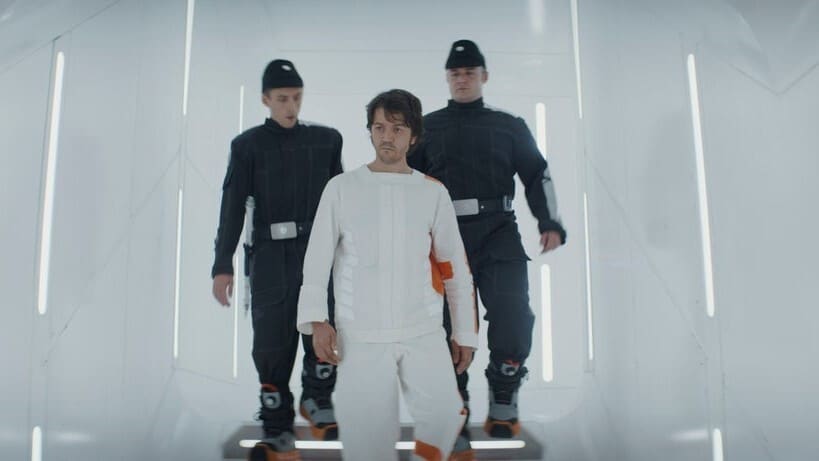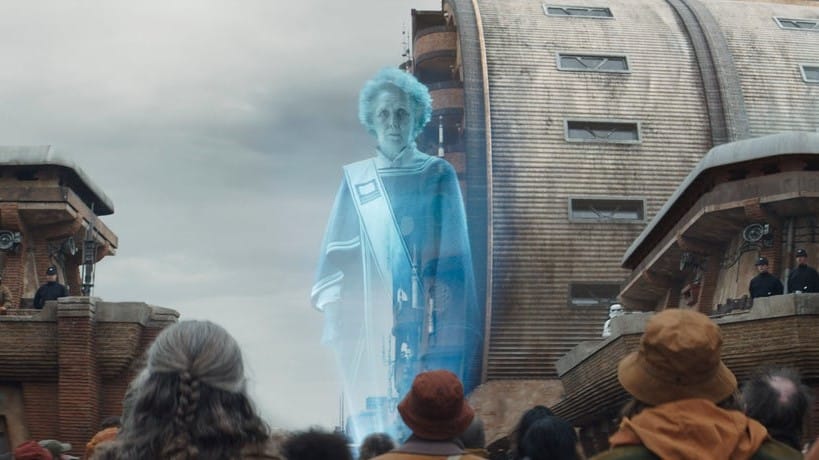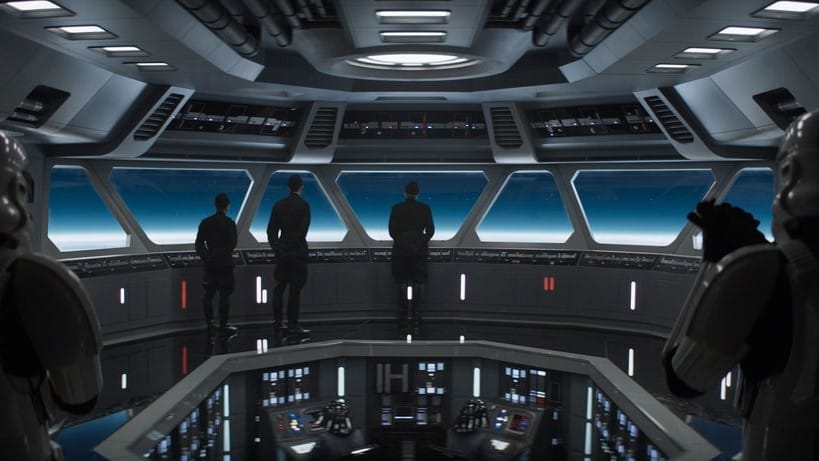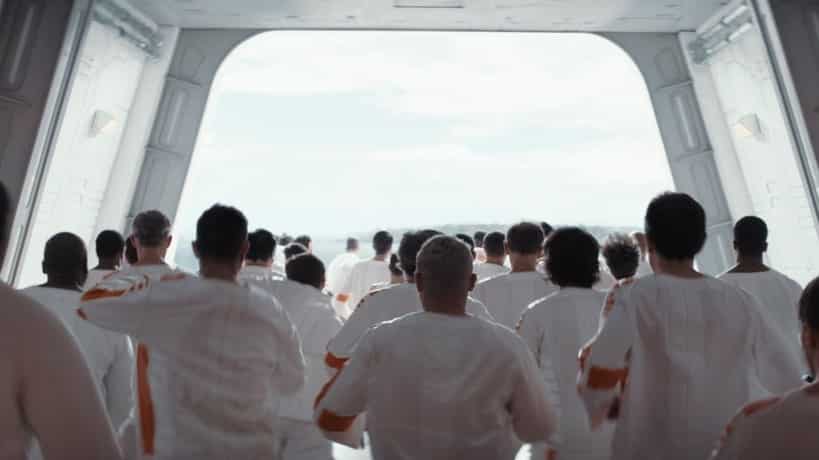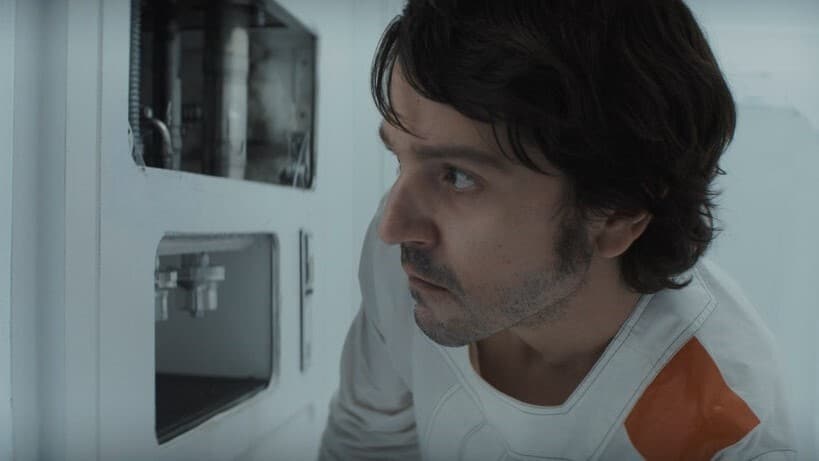With the Empire tightening its fist around friend or foe alike, Cassian “Keef” adjusts to his new life in an Imperial assembly line prison in “Narkina 5”, episode eight of Andor!
Armaan Babu: I…hello? I’ve been told that I’ve been picked for “recap and discussion labor”? I tried telling them I was planning on coming here anyway, but they dragged me over here and made me take my shoes off and…wait, what is that remote in your hands?
Austin Gorton: Look Armaan, I don’t want to use this if I don’t have to, but we all have bosses, okay? If we don’t get these recaps out, someone else will, and then there’s going to be hell to pay for all of us. If you didn’t want to get stuck here, you shouldn’t have been loitering on the internet.
Factory Settings

Armaan: So this one was a lot more Andor-centric than we’ve gotten used to, but Andor remains the least interesting character on screen. Maybe it’s because we talked about this in the last episode, maybe it’s because there’s more focus on him, but it stood out a lot more that he continues to be kind of a nothing character.
Part of the problem is that he’s spent so little time in this series actually being Andor. I am really missing his time with Maarva and B2EMO, because it feels like they were the only people he was allowed to be himself with.
Austin: That’s a really good point. He was “Clem” for three episodes, and now he’s been “Keef” for roughly another episode-and-a-half. And in both cases, he’s basically been the same person: quiet, removed, observing his surroundings and only interacting with them when absolutely necessary. Which makes him great as an audience surrogate, but kind of cruddy as an engaging character in his own right. I found all the prison sequences, the hierarchy and rules and structures involved, absolutely fascinating (in a depressing, authoritarian kind of way), but not because of anything Cassian did; he was just our excuse to be there watching it all.
Armaan: I gotta say, after seeing what things are like in the prison, it’s clear that there’s more arbitrariness to the Empire’s lengthy sentencing than I initially thought. I had assumed it was just a way for the Empire to flex, to break people into being terrified of authority. They also just need slave labor, and to keep that labor working so hard they don’t have the energy to rebel, much less the will.
Austin: The prison sequences were a great representation of the levels of the Empire’s power. They have the resources to just send you anywhere, to designate planets just to be prison worlds. Yet all those resources are not self-sustaining, so they harness your energy for the labor necessary to keep everything humming, and in the process, leave you too drained to object to the way you’re perpetuating their massive machine of oppression. It’s all frighteningly efficient.
Armaan: The show didn’t have to go this hard. They could have cut a half hour off of this episode and flashback to the future, have someone say in a throwaway line how bad things are there. But no, we go all in. Gollum Snoke Andy Serkis (I’m sorry, I’m never going to remember his Star Wars name when he’s Andy Serkis) explaining how the system works. How everyone is giving their all just for the chance of having flavor in their food mush for a night. How everyone’s so numb their biggest reaction to the suicide of a cellmate is annoyance and worry that that’s going to slow their table down the next day.
It’s bleak, it’s exhausting, and despite it being on the extreme end of things, the grind feels…uncomfortably familiar.
There Was Never Going to be Star Peace

Armaan: Outside of Narkina 5, it’s starting to feel like the side-plots are about to get a little more pointed, especially as the paths of Syril Karn and Dedra Meero collide. I loved their meeting. They’re both ambitious sycophants grubbing for the next rung on the ladder, but where Dedra is shrewd and knows how the game is played, Syril is…blind to everything but his need to be an essential cog in the machinery of the Empire. The way Dedra looks at his cries for attention with a mix of exasperation and pity is such a beautiful moment. Syril thinks that finally being able to tell his truth is the start of big things for him, but for Dedra, it’s just another Tuesday, just another underling to use and toss aside.
I had a lot of fun with their interactions.
Austin: I continue to love the way the series is developing Karn. This episode really hammered how he’s not so much a thematic opposite to Cassian but a thematic parallel. They are both, in their way, cogs trapped in the machinery of the Empire. Syril’s office farm (cuing the uncomfortably familiar again) doesn’t have a suicide floor (as far as we know) but it’s not a far cry from Cassian’s prison in terms of both visual uniformity and the expectation of uniform, controlled action on the part of both character’s supervisors. Since their first encounter, they’ve both been rebelling against the Empire, in their own ways (Syril isn’t getting thrown in jail for his acts of rebellion, but he’s as frustrated with the system in which he’s trapped as Cassian is), and both are kind of shitty and short-sighted about it: Cassian thought money could free him from the Empire, while Syril thought the righteousness of his cause would breakthrough if he shouted about it loud enough. And now they’re both stuck slaving away for the Empire.
Armaan: I keep thinking about how the plan here is to get the Empire to double down on its oppression – it’s even stated as much this episode – because despite the fear and paranoia they’re now living in, the only people who seem to have any agency in this show are the people who are rebelling. Maarva, finding new life in taking (frankly ridiculous) risks on behalf of the Rebels, Dedra, pushing at the edges of the rules just to get ahead – even Mon Mothma seems to have a lot more life in her now when we get to see how she operates.
While Mothma hasn’t exactly been successful in her endeavors yet, up until the past two episodes we’ve been largely focused on the cage she’s in – now, we get to see how she works within those constraints. It adds so much to her character, it makes her relatively minor appearances in the original trilogy mean that much more.
Her story is progressing slowly, though, which is fine for me given that she’s a secondary character on the show, but I’m very curious to see how her story intersects with Andor’s.
Austin: It’s fun how the Aldhani Raid — which Mon Mothma seemed opposed to — has nevertheless shifted her into a kind of “put up or shut up” mold, and while her progress is incremental, I continue to enjoy just watching her navigate her world, which is a prison as well in its own way (she has many more creature comforts than Cassian or even Karn, but is similarly unable to say and do whatever she wants, when she wants). In a way, it’s prequel storytelling at its best: we know where she’s going to end up, so we can focus on the why and the how of it instead of the what.
Armaan: So, I have a question for you: do you think Vel would have made for a better protagonist for this show if name recognition wasn’t so important?
I get that this show was a risk, and having it star a previously established character helps mitigate that risk somewhat, but putting that aside…Vel appears to be just naive enough about things to make for a good POV character, and driven enough to make for a character whose motivations are clear and easy to get behind.
She’s had far less screen time than Andor, but she’s having more of a character arc than he is. She’s gone from someone under enormous pressure to lead, has experienced failure, and is currently in the process of facing extremely harsh realities about the nature of the war she’s signed up for. Her story reflects the themes of the show more than Andor’s has.
Added to that, she’s got a romantic subplot with Cinta I am deeply invested in (we get as close to them explicitly saying it as Disney will allow). Vel still believes in happy endings, Cinta does not. Cinta’s true heart belongs to a war that has not yet begun. Cinta’s a little like Rachel of the Animorphs; she’s come into her own here, and I don’t think she would have any idea of what to do with herself when Star Wars becomes Star Peace.
Austin: If two decades plus of Expanded Universe novels have taught me anything, it’s that it never becomes Star Peace. But to your question, absolutely. Vel in her limited screen already seems setup as the more interesting – or at least traditional – protagonist. We talked about this before, but this show has had a puzzling aspect to it, a bit of “Him? Really?” to it, since Cassian seemed like the least interesting part of Rogue One. The trade off, we assumed, is that his relative blank slate would serve as a window into the early days of the Rebellion, and that’s largely held true, but there’s a legitimate question to be asked about whether or not building a series around a character like that is a smart idea.
Armaan. While no one’s going to be redoing Andor, I’m definitely hoping we get more of a spotlight on Vel and Cinta in the episodes to come.
Austin: Another thing this episode expands on is the tension within the nascent Rebellion. We see it in the interaction between Vel and Cinta, in which Vel feels like they’re owed a chance for a normal life after all they’ve done for the Rebels, while Cinta, the more fervent believer, insists the fight comes first. We see it between Luthen and Kleya, as they debate whether or not to cut Bix (and Cassian) loose when Bix reaches out to try to get word to Cassian about his mom, and we see it in the discussion between Luthen and Saw Gerrera at the end, with Saw insisting the Rebellion needs to be more zealous while Luthen laments the way Saw spends as much time fighting with the people ostensibly on his side as he does the Empire. This is a conflict that is still present in Rogue One, but it remains to be seen whether Cassian will play into it as anything more than an object of that tension.
Armaan: Yes, I’m fascinated that even within the rebellion, there are a number of different factions. As someone more deeply read in Star Wars lore than me, I’m sure this is no surprise to you, but to me it made me deeply fascinated with that galaxy far, far away than I have been before — which is always a mark of great storytelling, I want to dive even further into this very expansive world. Which leads me to one last question, Austin — for those who want to know more about what the early days of the Rebellion were like and the complications that arose, what would you recommend they watch or read?
Austin: It’s a trickier question than you might expect. Rebels is the obvious answer, as it takes place roughly contemporaneously to Andor and covers some similar ground, with both Mon Mothma and Saw Gerrera (as well as Princess Leia) making appearances over its run (it also introduces the concept of a Rebel agent named “Fulcrum”, which seems to be what Deedra’s declaration of a Rebel “Axis” in this episode is alluding to). But with two Jedi (one secret, one nascent) in its cast and it being ostensibly an action-adventure series aimed for a slightly younger audience, it’s telling a different kind of story than Andor. Similarly, Clone Wars and the Bad Batch have some episodes that tie in with the burgeoning Rebel alliance, but that would require a watch list I can’t put together on the fly.
On the novel side of things, Claudia Gray has a pair of novels, Leia: Princess of Alderaan and Bloodline, both of which are highly recommended. Bloodline is set before the Sequel Trilogy and deals more with the rise of the First Order, but there’s some interesting callbacks to the days of the Rebellion as well, and it strikes the same kind of geopolitical tone with which Andor occasionally flirts.
But honestly, as I wrote a little about elsewhere, Andor itself is in a unique position to sort of stitch all these little snippets of proto-Rebellion stories together into a cohesive narrative. We’re seeing some of that already, and I suspect we’ll see more as the series goes on and Cassian gets closer (physically and mentally) to where he is at the start of Rogue One.
Force Facts
- It’s revealed in this episode that Vel comes from money, and is rebelling against an well-off upbringing as well as the Empire, adding another element to the show’s class angle.
- One of the prisoners at Cassian’s workstation is Melshi; in Rogue One, Melshi will help orchestrate Jyn Erso’s escape from the penal colony on Wobani at the beginning of the money and later fights (and dies) on the beaches of Scarif as part of Rogue One.
- Their discussion in this episode would suggest Luthen isn’t aware Kleya gave Vel a kill order on Cassian last episode.
- Saw Gerrera is such a fascinating character: technically a creation of George Lucas, he (just barely) predates the acquisition of LucasFilm by Disney and has since appeared in every possible storytelling medium: two different animated series, a feature film, a video game, comics, and now a live-action series. And through it all he’s been consistently positioned as the most extreme element within whatever group he’s nominally fighting alongside.

